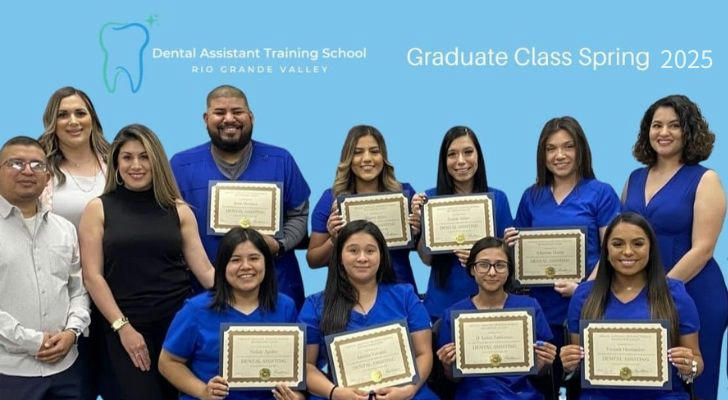Dental Assistant Course in Canada: Your Fast Track to a High-Paying Career
With increasing awareness of oral health in Canada, the demand for dental assistants is rapidly growing. The Dental Assistant course is an ideal choice for newcomers and career changers, offering low entry barriers, government support, and stable job prospects. This program can help you quickly embark on a high-paying career.

1. Low Barriers and Government Support
The Dental Assistant course typically requires 47 weeks of study, making it a faster and more affordable alternative to becoming a dentist. Many vocational and community colleges offer this course, and tuition fees can be covered through government programs like Employment Insurance (EI) and the Ontario Student Assistance Program (OSAP).
For example, data from Centennial College shows that the tuition fee for a Dental Assistant course is around CAD 13,000, but eligible students can receive financial aid to reduce the cost significantly.
2. High Employment Rate and Abundant Job Opportunities
Dental assistants are in high demand across Canada. According to Job Bank Canada, the employment growth rate for dental assistants is 8%, significantly higher than the average for other occupations. In regions like the Greater Toronto Area (GTA) and Vancouver, experienced dental assistants are especially sought after.
Bilingual professionals, particularly those fluent in Mandarin or Cantonese, are highly valued in Chinese-speaking communities. Employment data from Mount Royal University reveals that over 90% of their dental assistant graduates secure jobs within six months of graduation.
3. Stable Income and Career Growth
Dental assistants enjoy competitive starting salaries with opportunities for career growth. According to Job Bank Canada:
Average hourly wage in Canada: $25.44
High hourly wage: $33.00
Nova Scotia: Starting at $22.12/hour, with wages reaching up to $28.99/hour
With experience, dental assistants can advance to roles like Dental Treatment Coordinator or pursue further education to become a Dental Hygienist, leading to higher earnings and career advancement.
Moreover, some dental assistants pursue further training to specialize in areas such as orthodontics or oral surgery assistance, further enhancing their skills and salary potential. Continuous education through workshops and certifications is often supported by employers to ensure professional growth.
4. Clean and Professional Work Environment
Dental assistants work in clean, well-maintained environments such as dental clinics, hospitals, and dental laboratories. Responsibilities typically include assisting dentists, taking X-rays, sterilizing instruments, and providing patient care instructions.
This profession offers flexible work schedule options, with many clinics providing both part-time and full-time positions. The work environment is often collaborative, promoting a supportive and professional atmosphere.

5. Real Success Story: From Newcomer to Employed Professional
Case Study: Ms. Lin's Journey
Ms. Lin immigrated to Canada in 2022 with a medical background but faced challenges in finding a job due to language barriers and credential recognition issues. Upon discovering government funding opportunities, she enrolled in the Dental Assistant course at George Brown College.
After 47 weeks of study and practical training at a local dental clinic, Ms. Lin successfully passed the National Dental Assisting Examination Board (NDAEB) exam. She quickly secured a job at a Toronto dental clinic, starting with an hourly wage of $26.
"The Dental Assistant course not only helped me adapt to the Canadian work environment but also allowed me to enter a stable and well-paying healthcare career," says Ms. Lin.
Another example is Mr. Ahmed, who transitioned from working in hospitality to healthcare. By completing a Dental Assistant course at Vancouver Community College, he gained valuable hands-on experience through internships. Within months of graduation, he was offered a full-time position, earning $28 per hour.
6. How to Enroll in a Dental Assistant Course
The enrollment process is simple and typically involves the following steps:
Educational Requirement: A Grade 12 diploma with Grade 11 Science or equivalent.
Language Proficiency: International students may need to provide TOEFL or IELTS scores.
Clinical Experience: A signed agreement with a dentist for 14 hours per week of clinical practice.
Admission Interview: Conducted in person or over the phone.
Some institutions may also require applicants to complete a background check and show proof of up-to-date immunizations, as working in the healthcare sector requires a safe and hygienic environment.
7. Additional Benefits of the Dental Assistant Course
Comprehensive Curriculum: Covering topics such as dental radiography, infection control, and chairside assistance.
Hands-On Training: Internships and clinical placements provide valuable real-world experience.
Job Placement Assistance: Many programs offer career counseling and job placement support to help graduates find employment quickly.
Flexible Learning Options: Some institutions offer online or hybrid learning for greater convenience.

8. Conclusion
The Dental Assistant course offers an excellent opportunity for immigrants, career changers, and young professionals seeking a stable and high-paying career in Canada’s dental industry. With government financial support and hands-on training, graduates are well-positioned to enter the job market successfully.
If you're ready to become a part of Canada’s growing dental sector, now is the perfect time. Take the first step towards a rewarding career today!
